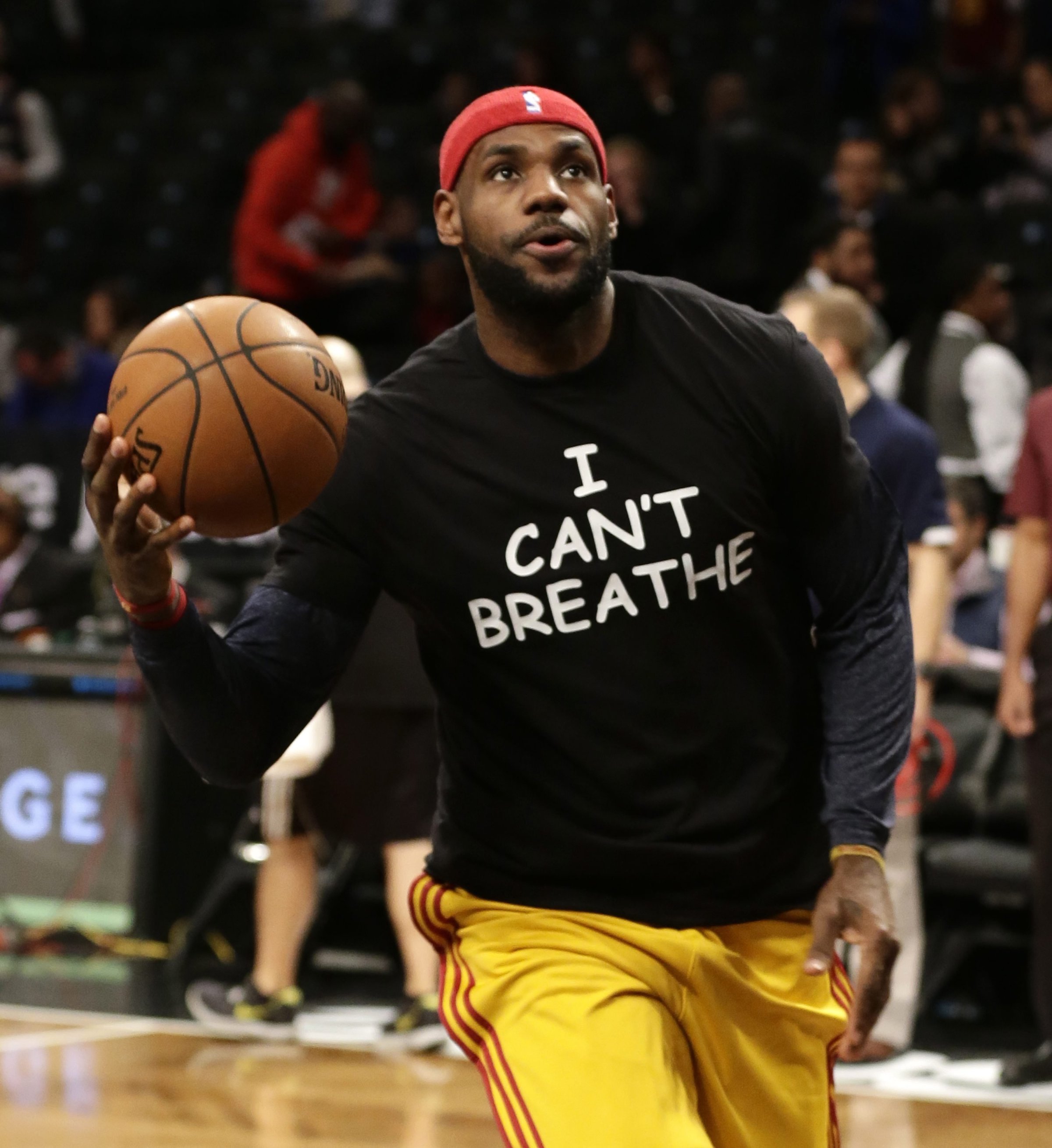
For nearly 50 years, John Carlos, the American sprinter who raised his arm and clenched his fist at the 1968 Olympics to protest racial inequality, has waited for a group of athletes to follow his example. To stand for something more than scoring points and pushing products.
His wait is finally over. In the weeks since grand juries returned non-indictments of police officers in the deaths of Michael Brown and Eric Garner, dozens of professional and college athletes have abandoned the safety of the sidelines to lend support for the protests over their killings. “I knew it would be coming sooner or later,” says Carlos, whose “black power” salute with teammate Tommie Smith has become an iconic image. “I’m extremely proud of these athletes. I think they have a brave heart. I think they have a vision. And I think they would like to see these issues resolved.”
Some of the biggest names in sports are leading the charge. LeBron James wore an “I Can’t Breathe” T-shirt before a Dec. 8 game to support the family of Garner, the New York City man whose last words — captured on video as police wrestled him to the ground — have become a slogan of the emerging movement. Even President Obama took note of James’ decision. “You know, I think LeBron did the right thing,” Obama told People in an interview published Thursday. “We forget the role that Muhammad Ali, Arthur Ashe and Bill Russell played in raising consciousness.”
Those athletes represented the peak of socially-conscious sports stars. Since then, most have followed the disengaged template perfected by Michael Jordan. In the early 1990s, Jordan refused to endorse an African-American Senate candidate trying to unseat right-winger Jesse Helms in Jordan’s home state of North Carolina. Though he might not have actually uttered the famous excuse for staying neutral that’s been attributed to him –“Republicans buy sneakers too” — Jordan followed this philosophy, and turned it into a marketing blueprint: Play nice, don’t offend, grow your personal brand. And whatever you do, stay out of politics.
James, the modern-day Jordan and Nike’s premium pitchman, and Derrick Rose, Adidas’ biggest name baller who was the first NBA star to wear an “I Can’t Breathe” T-shirt, have rewritten the rules. “We went through a long stretch there where [with] well-paid athletes the notion was: just be quiet and get your endorsements and don’t make waves,” Obama told People. “LeBron is an example of a young man who has, in his own way and in a respectful way, tried to say, ‘I’m part of this society, too’ and focus attention.”
For these players, the lack of consequences shows that they can take certain stances without sacrificing corporate clout. “Companies are a now little more willing to allow endorsers speak their mind,” says Paul Swangard, managing director of the Warsaw Sports Marketing Center at the University of Oregon. When asked about LeBron’s gesture, Nike said in a statement that “we respect everyone’s right to share and express different points of view.” Adidas says it supports the position of NBA commissioner Adam Silver; he appreciates free expression, but prefers that players stick to the pre-game dress code.
In Jordan’s day, brands could control what their athletes were saying. Nike, Adidas, and other companies now realize that since so many athletes interact with social media, where the protests played on a 24-hour loop, they’re bound to join the conversation. “It’s kind of an undercurrent that pulls you in,” says TNT analyst Kenny Smith, a former NBA player in the 1980s and 1990s.
For the athletes, it’s easier to speak if you know you’ll be heard — and supported. Social media offers a ready platform to spread a message. “When you have a million Twitter followers,” says Etan Thomas, who played in the NBA from 2001-2011 and was known as one of the more outspoken pro athletes of his era, “there’s tremendous power in that.”
And don’t discount the emotional element. A majority of NFL and NBA players are African-American, and many have had personal experiences of being profiled by cops. “Today’s athletes are starting to reflect outside of themselves,” says Carlos, who briefly played pro football before becoming a counselor and track coach at Palm Springs (Calif.) High School. “We wanted to unify ourselves to make a statement to society — enough is enough. I think that 46 years later, that cry is still out there. Enough is enough.”
More Must-Reads from TIME
- Donald Trump Is TIME's 2024 Person of the Year
- Why We Chose Trump as Person of the Year
- Is Intermittent Fasting Good or Bad for You?
- The 100 Must-Read Books of 2024
- The 20 Best Christmas TV Episodes
- Column: If Optimism Feels Ridiculous Now, Try Hope
- The Future of Climate Action Is Trade Policy
- Merle Bombardieri Is Helping People Make the Baby Decision
Write to Sean Gregory at sean.gregory@time.com